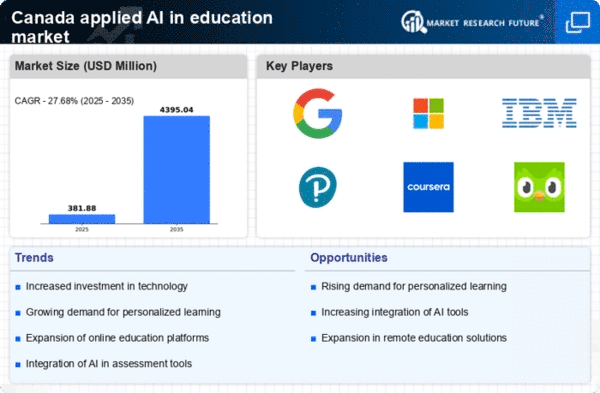Integration of AI in Curriculum Development
The integration of AI technologies into curriculum development is emerging as a pivotal driver for the applied ai-in-education market. Educational institutions in Canada are increasingly leveraging AI tools to analyze student performance data and identify gaps in knowledge. This data-driven approach allows educators to design curricula that are more aligned with student needs and industry requirements. For instance, a recent study revealed that 65% of educational leaders are prioritizing AI integration in their curriculum strategies. As a result, the applied ai-in-education market is likely to see substantial growth as institutions seek to enhance their educational offerings through innovative AI solutions.
Rising Importance of Data Privacy and Security
As the applied ai-in-education market expands, the importance of data privacy and security becomes increasingly critical. Educational institutions in Canada are tasked with safeguarding sensitive student information while utilizing AI technologies. The implementation of robust data protection measures is essential to maintain trust among students and parents. Recent surveys indicate that 80% of parents express concerns regarding data privacy in educational settings. Consequently, educational institutions are investing in AI solutions that prioritize data security, which may drive the growth of the applied ai-in-education market as they seek to comply with regulations and enhance their reputations.
Government Initiatives Supporting AI in Education
Government initiatives aimed at promoting the use of AI in education are significantly influencing the applied ai-in-education market. In Canada, various provincial governments are investing in AI research and development, providing funding for educational institutions to adopt AI technologies. These initiatives not only enhance the technological infrastructure of schools but also encourage collaboration between educational institutions and tech companies. For example, the Canadian government has allocated over $200 million to support AI research in education, which is expected to bolster the applied ai-in-education market by fostering innovation and improving educational outcomes.
Growing Demand for Customized Learning Experiences
The applied ai-in-education market is witnessing a notable increase in demand for customized learning experiences among students in Canada. This trend is driven by the recognition that traditional one-size-fits-all approaches often fail to meet diverse learning needs. As educational institutions increasingly adopt AI technologies, they can tailor content and learning pathways to individual student preferences and performance metrics. Reports indicate that approximately 70% of educators believe that personalized learning can significantly enhance student engagement and outcomes. Consequently, the applied ai-in-education market is expected to expand as schools and universities invest in AI-driven platforms that facilitate personalized learning, thereby improving overall educational effectiveness.
Collaboration Between Educational Institutions and Tech Companies
Collaboration between educational institutions and technology companies is emerging as a key driver for the applied ai-in-education market. Partnerships enable schools to access cutting-edge AI tools and resources that enhance teaching and learning experiences. In Canada, numerous universities are forming alliances with tech firms to develop AI-driven educational solutions. This collaborative approach not only fosters innovation but also ensures that educational content remains relevant to industry standards. Reports suggest that such partnerships could lead to a 30% increase in the adoption of AI technologies in classrooms, thereby propelling the applied ai-in-education market forward.
















